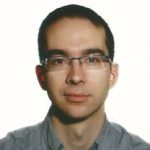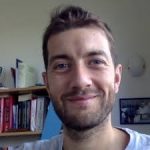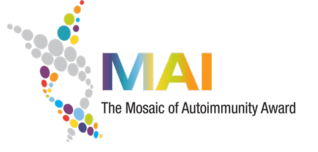MAI Award 2022
MAI Award Winners
The award ceremony will take place during the Plenary 1 session on Saturday, 11 June 2022

First Prize Winner
Iago Pinal-Fernandez, M.D., Ph.D., Ph.D., is a Staff Clinician in the Muscle Disease Unit of the NIAMS/NIH. He joined in 2015 as a Visiting Fellow, then transitioned to a Clinical Fellowship before becoming a Staff Clinician in 2021. Dr. Pinal-Fernandez is also an Adjunct Assistant Professor in the Department of Neurology at Johns Hopkins University School of Medicine.
Dr. Pinal-Fernandez graduated from the Santiago de Compostela School of Medicine and completed his Internal Medicine residency in the Vall d’Hebron hospital in Barcelona. He has two master’s degrees, one in Molecular Medicine and the other in Research Methodology in Health Sciences, as well as two doctoral degrees, the first in Medicine and the second in Bioinformatics.
Dr. Pinal-Fernandez’s research is focused on understanding the pathogenesis of inflammatory muscle diseases and on improving the diagnosis, prognosis, and treatment of patients with these conditions. To do so, he combines a variety of modalities of clinical and translational research. From a clinical perspective, he is involved in several natural history studies, and clinical trials to test novel treatments in patients with different types of myositis. Translationally, he is using bioinformatics and data science to understand inflammatory myopathies by combining clinical, epidemiological, and molecular data.

Second Prize Winner
Dr. Serena Colafrancesco is a Research Fellow of Rheumatology at “Sapienza” University, Rome, Italy. Her research activity encompasses clinical and translational studies, focusing primarily on Sjögren syndrome (SS) and on the role of epithelial cells in promoting microenvironmental inflammation. Following her graduation in 2009 and specialization in 2015 at “Sapienza” University, she sought and received training from leading international experts in the field of autoimmunity and SS: specifically, She attended the Rheumatology Research Lab of Prof. Buckley at Birmingham University (UK) under the supervision of Dr. F. Barone, as part of a joint international PhD program curriculum (between 2015 and 2019); in addition, in 2013 she has been a visiting research scholar in the laboratories of Prof. Shoenfeld (Zabludowicz Center for Autoimmunity, Tel Aviv, Israel). Recently, she further refined her research skills by completing a master program in Epidemiology and Biostatistics at Bicocca University, Milan, Italy (2020-21). These training opportunities were supported by competitive bursaries from the Italian Society of Rheumatology, as part of a program to support advanced training and international mobility of the most promising young scientists. She maintains strong and fruitful collaborative ties with my formers mentors, as documented by several publications in top journals (https://orcid.org/0000-0001-7802-1192). She is currently a member of several national and international research projects dedicated to the study of Sjogren’s Syndrome. Relevant collaborations include the Italian Study Group on Sjögren’s Syndrome (GRISS); Harmonicss – HORIZON 2020; eSSential – EULAR Sjögren’s Syndrome Experimental and Translational Investigative Alliance Study Group; Sjogren’s GWAS study (NIH-USA; Genes and Human Disease Research Program. Oklahoma Medical Research Foundation); Vita-Salute San Raffaele University, Milan, Italy; University of Colorado Denver, CO, USA; Queen Mary University of London and University of Birmingham, UK.

Third Prize Winner
Dr. Andrea Angeletti is a Medical Doctor and head of the Laboratory on Molecular Nephrology, Division of Nephrology, Dialysis and Transplantation at IRCCS Institute Giannina Gaslini in Genoa, Italy. Dr Angeletti graduated in Medicine and surgery at University of Bologna in 2011 and received a specialization in Nephrology with the highest honors in 2016. Then he moved to the United States for a postdoc position at Translational Transplant Research Center at Mount Sinai Hospital in New York headed by Prof. Peter Heeger and having as PI Prof Paolo Cravedi. His studies focused on the role of the complement cascade in immune nephrological disease and he investigated the immune role of erythropoietin. He got Ph.D. in Nephrological Sciences in 2021 at the University of Bologna. He is currently involved in studies on immune aspects of nephrotic syndrome funded by Italian Ministry of Health

The Mosaic of Autoimmunity, MAI Award, is a bi-annual award established to encourage progress in autoimmunity research.
Three young scientists will be awarded with Research Grant funding to their institutions for scientific projects in order to further develop their contribution to the field of autoimmunity through outstanding, creative and independent research.
The award ceremony for the MAI Award 2022 will be held during Autoimmunity 2022 Congress. Selection is made by an International Scientific Committee comprised of well-established authorities within the autoimmunity disease fields.
Application Submission is Now Closed
Main Prize: Up to $30,000 and an invitation to hold a plenary lecture at Autoimmunity 2022 Congress.
Two Additional prizes: Up to $10,000 and an invitation to present a lecture at Autoimmunity 2022 Congress.
This award is supported by the industry, please click here for further information.
- The deadline for applications is 31 January 2022
- Please note that the candidate must be registered to the congress by 31 January 2022.
- The winners will be announced in March 2022.
AWARD CONSIDERATIONS
The Scientific Committee will take into consideration the following:
- Quality and impact of scientific publications (= H index)
- Is the planned research in the forefront of international efforts?
- The quality and level of independence of the previous and planned research.
- Candidates must be up to the age of 40 as of 1 November 2021.
GUIDELINES FOR APPLICATION / NOMINATION
You can either apply for yourself or nominate somebody with his/her consent regarding the nomination and submission of personal data as described below. The candidate should not yet be an established scientist (not a head of department or professor).
Your application / nomination must include the following personal details:
- Full name
- Date of birth
- Institute/Hospital
- Department
- Full address
- Phone
- Fax
- Mobile
- Present official title/profession/position
- Degree
You will also be asked for the following:
- A motivational cover letter (half a page) why you / nominee should be a candidate for the Award.
- A list of all the candidates publications, divided into originals and reviews.
- Highlight 3–5 of his/her most important articles.
- Add a description of the Research Project including estimated detailed budget:
- Introduction with background on the relevance of the research,
- Project objectives
- Descriptions of methods
- Milestones, expected timeline and use of budget
- Expected impact on the scientific and medical field of autoimmunity
- Lit. References
The application needs to be endorsed by the Institution which will be the recipient of the Award payment.
Add the Institution name, contact details and bank account details of the Institution that will receive and administer the Award money.
The Award is granted under the condition that the Winner and his/her Institute/Hospital enters into a Research Grant Agreement with the supporting company (see details here), that Winner reports about use of the Award funding and unused funding is returned or used for other approved Research Grants.